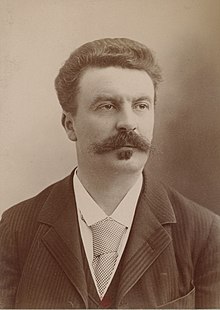Guy de Maupassant | |
|---|---|
 Photograph by Nadar | |
| Born | Henri René Albert Guy de Maupassant 5 August 1850 Tourville-sur-Arques, Normandy, France |
| Died | 6 July 1893 (aged 42) Passy, Paris, France |
| Resting place | Montparnasse Cemetery, Paris |
| Pen name | Guy de Valmont, Joseph Prunier |
| Occupation | Novelist, short story writer, poet, comedian |
| Genre | Naturalism, Realism |
| Signature | |
Henri René Albert Guy de Maupassant (UK: /ˈmoʊpæsɒ̃/,[1][2] US: /ˈmoʊpəsɒnt, ˌmoʊpəˈsɒ̃/;[2][3][4][5] French: [ɡi d(ə) mopasɑ̃]; 5 August 1850 – 6 July 1893) was a 19th-century French author, celebrated as a master of the short story, as well as a representative of the naturalist school, depicting human lives, destinies and social forces in disillusioned and often pessimistic terms.
Maupassant was a protégé of Gustave Flaubert and his stories are characterized by economy of style and efficient, seemingly effortless dénouements. Many are set during the Franco-Prussian War of the 1870s, describing the futility of war and the innocent civilians who, caught up in events beyond their control, are permanently changed by their experiences. He wrote 300 short stories, six novels, three travel books, and one volume of verse. His first published story, "Boule de Suif" ("The Dumpling", 1880), is often considered his most famous work.
- ^ "Maupassant, Guy de". Lexico UK English Dictionary. Oxford University Press. Archived from the original on 16 July 2021.
- ^ a b "Maupassant, Guy de". Longman Dictionary of Contemporary English. Longman. Retrieved 21 August 2019.
- ^ "Maupassant". Random House Webster's Unabridged Dictionary.
- ^ "Maupassant". Collins English Dictionary. HarperCollins. Retrieved 21 August 2019.
- ^ "Maupassant". Merriam-Webster.com Dictionary. Merriam-Webster. Retrieved 21 August 2019.